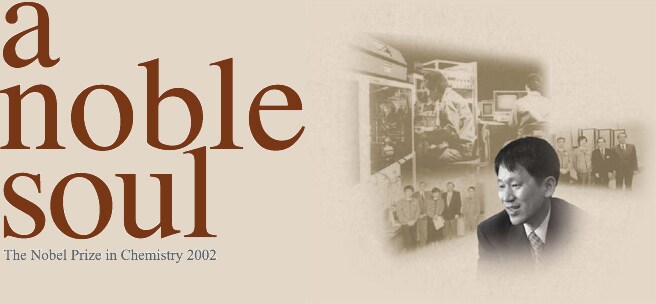|
Opening a New Door of Science
Six O'clock in the Evening on October 9th 2002
News arrived saying that Koichi Tanaka had won the Nobel Prize in Chemistry 2002
On October 9th, the Royal Swedish Academy of Sciences announced their decision to award the Nobel Prize in Chemistry 2002 to three people for their development of methods for identification and structure analyses of biological macromolecules. - Koichi Tanaka (at the time : Life Science Laboratory Assistant Manager of Shimadzu Corporation), Prof. John B. Fenn (Virginia Commonwealth University, USA) and Prof. Kurt Wuthrich (Swiss Federal Institute of Technology)
Koichi Tanaka is the twelfth Japanese individual to receive the Nobel Prize and the first post-war- born Laureate. He was 43 years old when the award was announced, which makes him the second youngest after Prof. Hideki Yukawa, who was 42 when he was awarded the Nobel Prize in Physics in 1949. Moreover, Tanaka is the first ever person to win the Nobel Prize without a master's or doctor's degree, having become a researcher after graduating from university without entering a graduate school. The award caused a sensation in and outside of Japan since the Laureate himself and even his associates found it hard to believe that such an award would be bestowed.
The work that merited Tanaka his award involved "the development of soft desorption ionization methods for mass spectrometric analyses of biological macromolecules". Through this work, Tanaka opened the way for the accurate but simple mass spectrometric analysis of macromolecules, such as proteins, that are extremely difficult to analyze by conventional methods because of their high molecular weights.
In the world of life science, we are in a post-genome era where the focus of research has shifted to proteomics to reveal the structures and functions of proteins. Tanaka's research has provided the opportunity for astounding developments in proteomics, which in turn have afforded significant progress in the development of new drugs, to the extent that the world can look forward to applications in the field of medical care such as early diagnosis of cancer.
Nevertheless, as Koichi Tanaka repeatedly stressed at the initial press conference upon notification of the award, this major feat was not his work alone but the effort of many people. He was aided by co-researchers who shared in the pain and joy of the work, company colleagues who warmly supported his untiring efforts, and researchers who had the insight to see the significance of Tanaka's discovery and who disseminated it to the world.
Here, let us take a short look at the R&D history to see the road that Koichi Tanaka traveled to reach the Nobel Prize.
|



